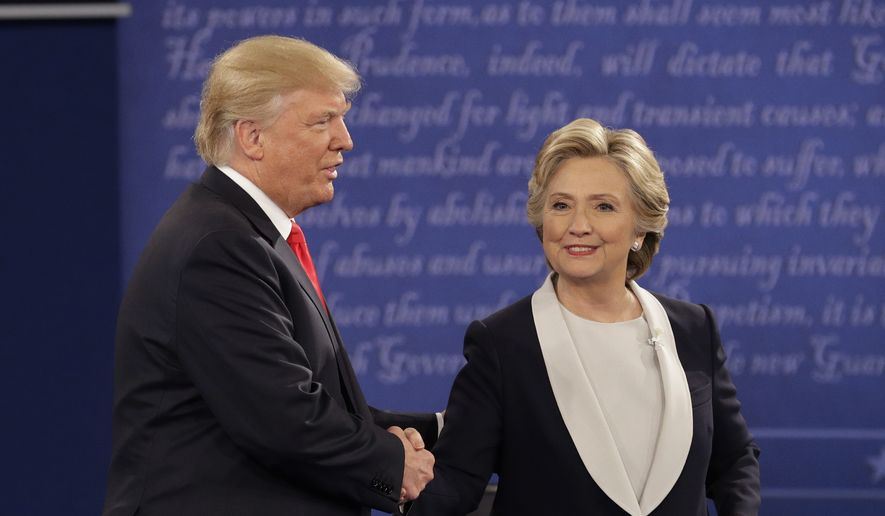OPINION:
Editor’s note: One in a series on the impact of the Constitution and Federalist Papers in today’s America.
The 2016 presidential election derailed the anticipated coronation of former Secretary of State Hillary Clinton. While she won the popular vote by 2.9 million votes, Donald Trump won a comfortable 306-232 victory in the Electoral College by carrying 30 states.
The difference between the electoral and popular winners was the fifth time that has happened. Two of them have occurred in the last five election cycles.
That the candidate who received the most votes did not win the election is viewed by some as an egregious assault on democracy. This group concludes that it is time to abolish the Electoral College. Mrs. Clinton unsurprisingly takes this view.
Before arguing the merits of the Electoral College, let us first dismiss the claims that the 2016 election was somehow an egregious assault on democracy by denying Mrs. Clinton her rightful, overwhelming victory. First, she received 48% of the vote, failing even to attain a majority. She won the popular vote by just 2 percentage points, which is equivalent to less than a dozen voters switching their votes in each precinct.
Thought of another way, more than 70% of eligible voters did not cast a ballot for her. All the difference in the popular vote resides in California alone (which cast 4.3 million more votes for Mrs. Clinton than Mr. Trump).
Had there been a national popular vote, California alone would have overwhelmed the collective vote of all of the other states combined and would have solely determined the presidency.
Which of the other 49 states would agree to be relegated to electoral irrelevance?
The real reason that some seek to abolish the Electoral College is brazen partisan politics. As Reince Priebus said after the 2016 election: “It is about Democrats that can’t accept the outcome of the election. It’s about delegitimizing the American system.”
The Democrats’ effort to delegitimize Mr. Trump’s victory, helped along by the largely accommodating media, began before he took the oath of office and never relented.
The electoral system warrants our acceptance for the pragmatic, very American reason that it works. It elects the president by the states and the people by a fair process that yields a majority. The Electoral College works because it ensures that the president is elected with a national coalition of states. It mitigates the effects of small factions, discourages assemblages of opportunistic blocs with disparate agendas, and organizes the elections at the state level.
Evidencing the Electoral College’s pragmatism, the United States has never elected a fringe candidate as president (like Hitler in Germany), a candidate with an exclusively regional appeal (like the Dixiecrats), a candidate with a narrow agenda (like the Know Nothings) nor a candidate who has assembled an opportunistic electoral coalition (like parliamentary systems).
We are a nation of states. The states created the federal government, and it is fitting that they play an essential role in presidential elections.
Aggregating votes by states prevents the disaster that could result from a national popular vote. In a popular vote scheme, whenever there might be a close national popular vote, each of about 175,000 precincts in America would become like the few contested precincts in Florida in the 2000 presidential election.
Elections by states isolate the votes into smaller, distinct areas in which controverted votes and outcomes can be more readily contained, especially given that most states’ outcomes are more definitive than the national outcome. Who wants to institutionalize the drama of November and December 2000?
Being pragmatists, we Americans can continue to reform our presidential election process without changes to the Constitution. Let the states work out how they allocate their electors, perhaps in concert with one another.
One such effort is the National Popular Vote Interstate Compact. This effort seeks to require a state’s electors to be cast for the winner of the national electoral vote. This is an interesting effort, although it is easy to imagine that it devolves into incoherence by requiring a state’s electors to vote for a candidate that the state itself explicitly rejected.
Let’s stick with what works and allow the Electoral College to function as intended at the intersection of the voices of the people and the states.
• David S. Jonas is a partner at Fluet Law Firm and an adjunct professor at Georgetown and George Washington University law schools. Patrick Rhoads has 40 years of experience in or with the federal government with backgrounds in engineering, management and policy.





Please read our comment policy before commenting.